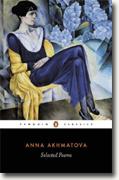Selected Poems
Anna Akhmatova
book reviews:
· general fiction
· chick lit/romance
· sci-fi/fantasy
· graphic novels
· nonfiction
· audio books
· author interviews
· children's books @
curledupkids.com
· DVD reviews @
curledupdvd.com
newsletter
win books
buy online
links
home
for authors
& publishers
for reviewers

 |
Selected Poems Anna Akhmatova Penguin Paperback 160 pages July 2006 |
|
As an English speaker attempting to reflect the fullness and timbre of a mighty Russian woman writing poetry, I am regrettably
lacking for the task. To properly read Selected Poems
Akhmatova’s early poems are markedly sensuous, bringing the opulence of emotion to the page without extraneous sentiment. From 1911, while she was married to her first husband, Nikolai Gumilev, but abandoned by him: "White Night"Gumilev and Akhmatova were among a small group of poets who coined the term acmeism to refer to their efforts to reject the flowery symbolism that characterized much of 19th-century poetry. The acmeist movement began in 1910, about the time Akhmatova’s first volume, Evening, was published, and the year she married Gumilev. The acmeists were among the first modern Russian poets, using the language to paint vivid, crisp word portraits rather than relying upon highly symbolic reference to lead the enlightened reader toward understanding. Akhmatova’s poems speak to everyone. She blazes into the early twentieth century writing modern emotive poetry. Many of the early selections touch on questions that are always near any romantic relationship. Her images of longing and intimacy in her early pieces are clear and close without veering into explicitness. This, from 1913: "A Ride"Acmeism indeed! One highlight of the second section, from Rosary (1914), is "By the Seashore," the demonstration of a young woman longing for her lover to return from sea: Autumn changed to rainy winter,"By the Seashore" is resplendent with emotion, though never on the cheap. Akhmatova writes as one who has waited and waited, which she did for almost twenty years, later in the century, as her son was caught up in the Stalinist Terror. The final section includes two of Akhmatova’s masterpieces, "Requiem" and "Poem Without a Hero." "Requiem" was composed during the years of her son’s imprisonment by Stalin. It takes the form of several laments… "4"…interspersed with bits of darkly ironic Christian symbolism: from "Crucifixion"Revered and loved by men, adored by other women, and feared by the Stalinist regime, Akhmatova endures upon Russian and Western literature. The flaw of Selected Poems Originally published on Curled Up With A Good Book at www.curledup.com. © Beth Thomas, 2007 |
|
|
|
 Click here to learn more about this month's sponsor! |
|
| fiction · sf/f · comic books · nonfiction · audio newsletter · free book contest · buy books online review index · links · · authors & publishers reviewers |
|
| site by ELBO Computing Resources, Inc. | |
 Anna Akhmatova’s
Anna Akhmatova’s